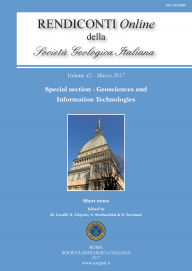
Software tools for sustainable water resources management: the GIS-integrated FREEWAT platform
Giovanna De Filippis (a), Iacopo Borsi (b), Laura Foglia (c), Massimiliano Cannata (d), Violeta Velasco Mansilla (e), Enric Vasquez-Suñe (e), Matteo Ghetta (a) & Rudy Rossetto (a)
(a) Istituto di Scienze della Vita, Scuola Superiore Sant'Anna, Pisa, Italy. Corresponding author e-mail: g.defilippis@sssup.it.
(b) TEA SISTEMI S.p.A., Pisa, Italy.
(c) Institut für Angewandte Geowissenschaften, Technische Universität Darmstadt, Darmstadt, Germany.
(d) Istituto di Scienze della Terra, Scuola universitaria professionale della Svizzera italiana, Canobbio, Switzerland.
(e) Instituto de Diagnóstico Ambiental y Estudios del Agua, Consejo Superior de Investigaciones Científicas, Barcelona, Spain.
Volume: 42/2017
Pages: 59-61
Abstract
This paper aims at presenting the open source and public domain FREEWAT platform capabilities for water resource management, including: (i) pre-processing modules to facilitate the preparation of input data, (ii) modelling tools for the analysis of several processes aimed at supporting water resource management, and (iii) post-processing tools to present results.
The FREEWAT platform is based on open source solutions to perform an integrated coupling between the QGIS desktop software, surface and subsurface model engines, mostly based on fully distributed and numerically-based codes developed by the USGS, and other software applications, and the SpatiaLite spatial database. The development of the FREEWAT platform was supported by the main needs and priorities expressed by relevant stakeholders from the water sector involved in the early stage of the project.
Extensive testing on the platform is still going on and training material and six User Manuals were prepared to disseminate its use as a standard software for managing surface/sub-surface water quantity and quality dynamics under demand-driven and supply-constrained conditions. The testing phase also includes demonstration of the platform capabilities on 14 case studies at European scale and beyond, to address specific water management issues. Nine of them are devoted to the application of EU water-related Directives, while the others address water management issues in the rural environment under the requirements of EU and/or national/local regulations. Beyond software testing, this demonstration is thought as an experiment on involving stakeholders in the formation of water plans yet during the technical phase of the analysis.
Keywords
Get Full Text